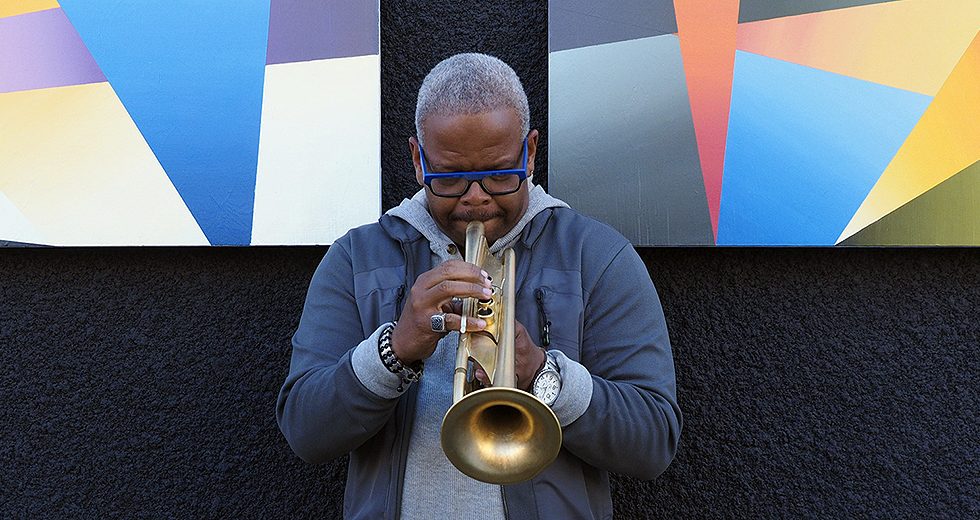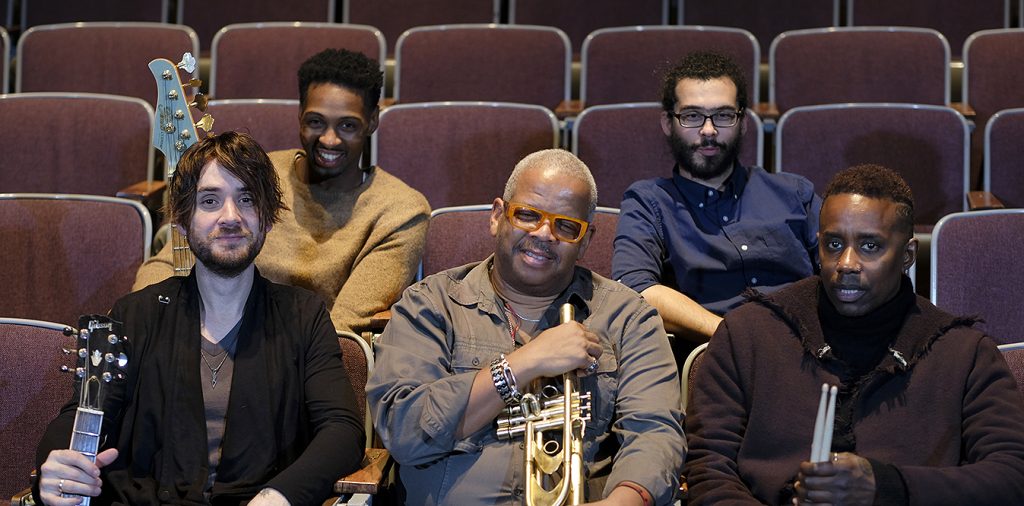
Just recently, a man walked up to trumpeter and composer Terence Blanchard after one of his performances. He told Blanchard he was expecting to hear the lush melodies of “A Tale of God’s Will (A Requiem for Katrina),” Blanchard’s Grammy-winning work from 2007. But instead, he was confronted with the music of “Live,” which at time rages with electric blues guitar, ominous synthesizers chords and Blanchard’s charging trumpet.
“But then you told us what the music was about,” he told Blanchard (who performs May 18 at Orchestra Hall as part of the SCP Jazz Series). “I had to think that if the guy who created ‘Tale of God’s Will’ is so angry, then I have to rethink my position about gun control.”
His response greatly affected Blanchard, who says “Live” (2018, Blue Note) was a direct response to the gun violence that increasingly screams across news sites and television news crawls every day. “We are telling people wherever we go, we know you’re frustrated. Let this music heal your anger. We need to let the music heal you,” he says.
“Live” is Blanchard’s 16th album but it represents a continuing thread since “God’s Will,” which is connected to “When the Levees Broke: A Requiem in Four Acts” (2006), a four-hour HBO documentary film by director Spike Lee that explored the root causes and aftermath of Hurricane Katrina on New Orleans, Blanchard’s hometown. The music captured the emotional turmoil of Katrina and helped serve as a cathartic salve for those mourning personal losses.

Terence Blanchard (center) and the E-Collective consists of guitarist Charles Altura (clockwise, from lower left), bassist David “DJ” Ginyard, keyboardist Fabian Almazan and drummer Oscar Seaton. | Photo: Henry Adebonojo/IMN
More recently on “Breathless” (2015), his last album, two songs were inspired by recent police shootings of unarmed black men. The title song quotes Eric Garner, the black man who died 2014 in New York City after police officers put him in a chokehold and killed him. “It’s hard as an artist to witness those things and try to write ‘don’t worry, be happy music,’ ” Blanchard says. “I can’t do it in good conscience. Because people are dying,” says.
Although his roots are in jazz, Blanchard, 56, has always traversed musical borders with his experiments within jazz, soul and funk. As a former member of Art Blakey’s Jazz Messengers, with a solo career featuring collaborations with people as divergent as saxophonist Donald Harrison and Latin jazz percussionist Poncho Sánchez, Blanchard has always pursued music that tells stories through melody. His compositions, including his work on Spike Lee films (he has scored all of them since 1991), also reflect a restless spirit that is not bound by expectations.
“Live” is also his second recording with E-Collective, consisting of Charles Altura on guitar, Fabian Almazan on piano and synthesizers, Oscar Seaton on drums and David “DJ” Ginyard on bass. The seven original songs are drawn from performances recorded in Minnesota, Cleveland and Dallas: cities where incidents of gun violence have become international news. The first two cities were selected after the shooting deaths of Philando Castile and Tamir Rice, both unarmed, by police. The Dallas concert was prompted by the deaths of four police officers during a 2016 Black Lives Matter protest.
At each concert, Blanchard and his band worked to engage local audiences by participating in panel discussions or bringing youth-program members to rehearsals and soundchecks. The project, he says, represents his “little megaphone” to keep the issue from being buried. He worries how the continued killings of unarmed black people, as well as rising anti-Semitism, are becoming normalized. There is dismay when he sees politicians retiring to dodge the issue or doing very little in the first place. He likens the complacency to last summer’s fracas over whether Confederate statues should be allowed to remain standing in New Orleans. For years, he and countless others drove by all of them, a desensitizing process that ended once the statues came down. He remembers watching with his daughter for four hours, waiting for one to topple. Once it did, he said he felt “a weight” fall off his shoulders and the feeling that “now the space feels it’s for everybody” — not just those mired in a certain side of the city’s distant past.
“Before ‘Tale of God’s Will,’ I never considered myself an activist,” he says. “Truth be told, if there’s one thing with the gun violence issue that I want to get across to people, it’s how much of this is our fault. Because we’re not being active. You can’t sit on the sidelines. People have to fight for their freedom, and we’re going to have to fight for justice. It’s a test of the soul of the country.”
Chicago-based journalist Mark Guarino writes for the Guardian, Crain’s Chicago Business, the Washington Post, Salon, the Chicago Tribune, Reuters, Agence France-Press and other outlets.